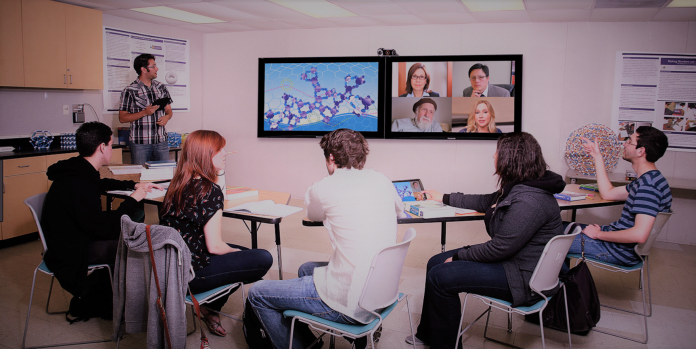It was the case that in past times getting higher education was only available to people. Who were able to leave their homes and go to one of the Ivy League schools. Today’s technological advancements have made feasible for everyone with access to the internet. And have access to some of the top education resources available. It’s no question that the use of technology is having an enormous impact,on every industry and higher education is not an exception. What other ways can technology have impacted the field of education?
Here are a few examples of ways that technology is changing the direction of education in the near future:
1.Online Learning Platforms:

One of the ways that technology has transformed education is the advent in the number of educational platforms that are online. These platforms let students access a vast array of educational materials, such as lecture materials, course material as well as interactive classes. They also provide a simple way for teachers to interact with their students, and offer personalized feedback on their assignments. Another benefit of this type of education is the fact that it allows education to be more accessible to students who live in rural or under-served areas.
So it doesn’t matter if you’re a student seeking to improve your knowledge or a teacher in search of new methods and tools to teach your pupils, it’s evident that technology has had an impact on the education field. The possibility to purchase homework online makes learning online even more enjoyable. If you’re busy, this is the most effective option.
2.Easy Access To Learning Materials
Technology has made it easier for students to access instructional resources in addition to the online learning platforms.Today, educational materials can be accessible online via a variety of websites and applications, which include video lectures, interactive quizzes, interactive lectures, and ebooks. Furthermore several universities and colleges are now offering online courses which anyone can access at any time. So, even though you can’t attend a traditional school or university because of cost or geographical limitations You can still get access to the best educational materials and further your education on your own.
3.Increasing Connectivity:

Another great advantage of modern technology is its improved access to other people as well as information. With social networks, video conferencing, and other platforms on the internet it is now possible to meet with other people around the globe to exchange ideas, work on projects and learn from one another in previously unimaginable ways. This allows education to be more accessible to everyone and provides opportunities for collaboration and creativity.
4.Implementation Of AI Technology:
The introduction of Artificial Intelligence (AI) has dramatically altered the technological landscape and changed the traditional approach to education. Education institutions have been increasingly incorporating AI into their curriculum in different ways, because this provides new possibilities to enhance learning. For instance AI-powered chatbots are utilized to offer students real-time assistance and advice on classes or subjects that are related to their studies. Bots are particularly beneficial to those who need individualized tutoring because the curriculum can be customized according to each student’s specific strengths and weaknesses.
Additionally, AI allows universities and educational institutions to automate everyday tasks like grading assessments and testing papers. This is much more effective than manual methods of processing and guarantees that every assignment is judge unbiasedly by a computer-based algorithm. This improves the teaching quality for learners of all levels. With the advent of AI technology higher education learning will stand to benefit learners and schools alike.
5.Crowdfunding:

Crowdfunding is a novel method of fundraising that makes use of the potential of social media and technology to generate money for different causes. It involves establishing the campaign’s page, advertising it by bringing together supporters who donate funds via the internet or through donations. This groundbreaking idea can be utilize to help fund various causes, including initiatives in higher education. In allowing everyone around the globe to make contributions towards the pursuit of institutionally appropriate goals, crowdfunding has revolutionized the way universities raise money for funding opportunities for research and grants.
Furthermore, it promotes collaboration between institutions and individuals providing students with accessibility to services that may otherwise be unavailable because of financial constraints or geographic location. In conclusion, crowdfunding offers universities the opportunity to design engaging learning experiences for students through the use of technologies to raise money to fund educational programs.
6.The Use Of Blockchain To Secure Student Data:

Blockchain is an innovative digital technology that is the basis for the infrastructure of cryptocurrencies such as Bitcoin. It is an open database that keeps the records of transactions that are secure and data between members of the network. Blockchain technology offers an extra layer of protection for all activities conducted online, for instance, it can improve data security for students. security. For instance, it could enable student information to be safely share when interacting with schools and different educational establishments, like health providers or governmental institutions. Data on students can also be more accurately update than traditional central databases because there is no single point of failure that exists to allow hackers to target and cause security breaches.
In addition Blockchain-based systems are built with access control measures that come with precise privacy settings that can be utilize to block access to private student data. This technology allows educational institutions to make sure that student data is secure and safe.
Conclusion:
It’s true There are a myriad of inventive ways colleges and universities can incorporate AI technology in their curriculum to enhance the learning experience for students. Chatbots can be use to help grade tasks, using blockchain technology to safeguard the data of students. It’s obvious that AI is a great tool to drive innovation within higher-education. If you’re an instructor, or administrator at a school, you should think about incorporating some of these new and exciting technologies, into your school’s curriculum in the near future.
See our Other latest posts: development-of-igaming-in-the-united-states & technological-innovation



